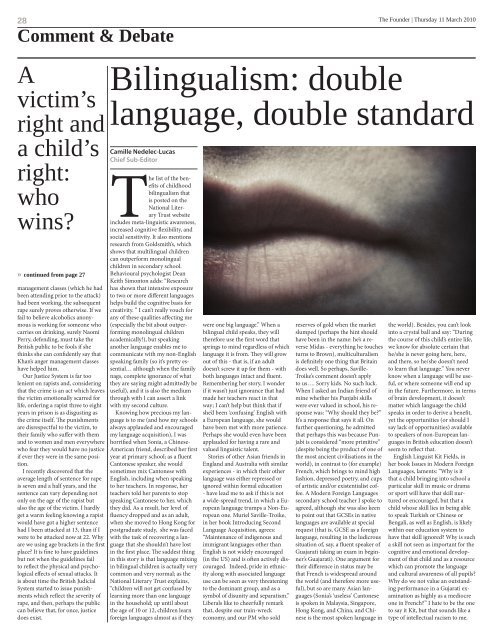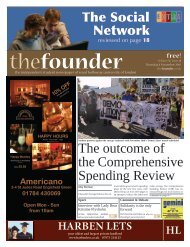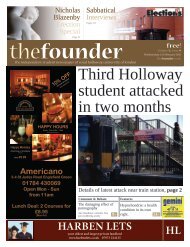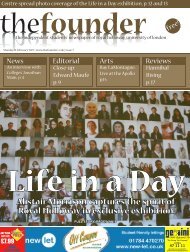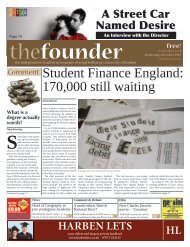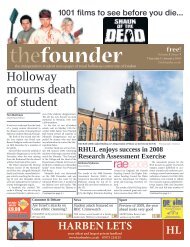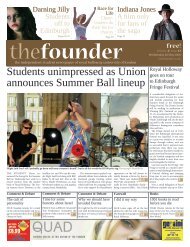HARBEN LETS HL Fashion Show Preview - The Founder
HARBEN LETS HL Fashion Show Preview - The Founder
HARBEN LETS HL Fashion Show Preview - The Founder
Create successful ePaper yourself
Turn your PDF publications into a flip-book with our unique Google optimized e-Paper software.
28<br />
Comment & Debate<br />
A<br />
victim’s<br />
right and<br />
a child’s<br />
right:<br />
who<br />
wins?<br />
» continued from page 27<br />
management classes (which he had<br />
been attending prior to the attack)<br />
had been working, the subsequent<br />
rape surely proves otherwise. If we<br />
fail to believe alcoholics anonymous<br />
is working for someone who<br />
carries on drinking, surely Naomi<br />
Perry, defending, must take the<br />
British public to be fools if she<br />
thinks she can confidently say that<br />
Khan’s anger management classes<br />
have helped him.<br />
Our Justice System is far too<br />
lenient on rapists and, considering<br />
that the crime is an act which leaves<br />
the victim emotionally scarred for<br />
life, ordering a rapist three to eight<br />
years in prison is as disgusting as<br />
the crime itself. <strong>The</strong> punishments<br />
are disrespectful to the victim, to<br />
their family who suffer with them<br />
and to women and men everywhere<br />
who fear they would have no justice<br />
if ever they were in the same position.<br />
I recently discovered that the<br />
average length of sentence for rape<br />
is seven and a half years, and the<br />
sentence can vary depending not<br />
only on the age of the rapist but<br />
also the age of the victim. I hardly<br />
get a warm feeling knowing a rapist<br />
would have got a higher sentence<br />
had I been attacked at 13, than if I<br />
were to be attacked now at 22. Why<br />
are we using age brackets in the first<br />
place? It is fine to have guidelines<br />
but not when the guidelines fail<br />
to reflect the physical and psychological<br />
effects of sexual attacks. It<br />
is about time the British Judicial<br />
System started to issue punishments<br />
which reflect the severity of<br />
rape, and then, perhaps the public<br />
can believe that, for once, justice<br />
does exist.<br />
<strong>The</strong> <strong>Founder</strong> | Thursday 11 March 2010<br />
Bilingualism: double<br />
language, double standard<br />
Camille Nedelec-Lucas<br />
Chief Sub-Editor<br />
<strong>The</strong> list of the benefits<br />
of childhood<br />
bilingualism that<br />
is posted on the<br />
National Literary<br />
Trust website<br />
includes meta-linguistic awareness,<br />
increased cognitive flexibility, and<br />
social sensitivity. It also mentions<br />
research from Goldsmith’s, which<br />
shows that multilingual children<br />
can outperform monolingual<br />
children in secondary school.<br />
Behavioural psychologist Dean<br />
Keith Simonton adds: “Research<br />
has shown that intensive exposure<br />
to two or more different languages<br />
helps build the cognitive basis for<br />
creativity. ” I can’t really vouch for<br />
any of these qualities affecting me<br />
(especially the bit about outperforming<br />
monolingual children<br />
academically!), but speaking<br />
another language enables me to<br />
communicate with my non-English<br />
speaking family (so it’s pretty essential…<br />
although when the family<br />
nags, complete ignorance of what<br />
they are saying might admittedly be<br />
useful), and it is also the medium<br />
through with I can assert a link<br />
with my second culture.<br />
Knowing how precious my language<br />
is to me (and how my schools<br />
always applauded and encouraged<br />
my language acquisition), I was<br />
horrified when Sonia, a Chinese-<br />
American friend, described her first<br />
year at primary school; as a fluent<br />
Cantonese speaker, she would<br />
sometimes mix Cantonese with<br />
English, including when speaking<br />
to her teachers. In response, her<br />
teachers told her parents to stop<br />
speaking Cantonese to her, which<br />
they did. As a result, her level of<br />
fluency dropped and as an adult,<br />
when she moved to Hong Kong for<br />
postgraduate study, she was faced<br />
with the task of recovering a language<br />
that she shouldn’t have lost<br />
in the first place. <strong>The</strong> saddest thing<br />
in this story is that language mixing<br />
in bilingual children is actually very<br />
common and very normal; as the<br />
National Literary Trust explains,<br />
“children will not get confused by<br />
learning more than one language<br />
in the household; up until about<br />
the age of 10 or 12, children learn<br />
foreign languages almost as if they<br />
were one big language.” When a<br />
bilingual child speaks, they will<br />
therefore use the first word that<br />
springs to mind regardless of which<br />
language it is from. <strong>The</strong>y will grow<br />
out of this - that is, if an adult<br />
doesn’t screw it up for them - with<br />
both languages intact and fluent.<br />
Remembering her story, I wonder<br />
if it wasn’t just ignorance that had<br />
made her teachers react in that<br />
way; I can’t help but think that if<br />
she’d been ‘confusing’ English with<br />
a European language, she would<br />
have been met with more patience.<br />
Perhaps she would even have been<br />
applauded for having a rare and<br />
valued linguistic talent.<br />
Stories of other Asian friends in<br />
England and Australia with similar<br />
experiences - in which their other<br />
language was either repressed or<br />
ignored within formal education<br />
- have lead me to ask if this is not<br />
a wide-spread trend, in which a European<br />
language trumps a Non-European<br />
one. Muriel Saville-Troike,<br />
in her book Introducing Second<br />
Language Acquisition, agrees:<br />
“Maintenance of indigenous and<br />
immigrant languages other than<br />
English is not widely encouraged<br />
(in the US) and is often actively discouraged.<br />
Indeed, pride in ethnicity<br />
along with associated language<br />
use can be seen as very threatening<br />
to the dominant group, and as a<br />
symbol of disunity and separatism.”<br />
Liberals like to cheerfully remark<br />
that, despite our train-wreck<br />
economy, and our PM who sold<br />
reserves of gold when the market<br />
slumped (perhaps the hint should<br />
have been in the name: he’s a reverse<br />
Midas - everything he touches<br />
turns to Brown), multiculturalism<br />
is definitely one thing that Britain<br />
does well. So perhaps, Saville-<br />
Troike’s comment doesn‘t apply<br />
to us…. Sorry kids. No such luck.<br />
When I asked an Indian friend of<br />
mine whether his Punjabi skills<br />
were ever valued in school, his response<br />
was: “Why should they be?”<br />
It’s a response that says it all. On<br />
further questioning, he admitted<br />
that perhaps this was because Punjabi<br />
is considered “more primitive”<br />
(despite being the product of one of<br />
the most ancient civilisations in the<br />
world), in contrast to (for example)<br />
French, which brings to mind high<br />
fashion, depressed poetry, and cups<br />
of artistic and/or existentialist coffee.<br />
A Modern Foreign Languages<br />
secondary school teacher I spoke to<br />
agreed, although she was also keen<br />
to point out that GCSEs in native<br />
languages are available at special<br />
request (that is, GCSE as a foreign<br />
language, resulting in the ludicrous<br />
situation of, say, a fluent speaker of<br />
Guajarati taking an exam in beginner’s<br />
Guajarati). One argument for<br />
their difference in status may be<br />
that French is widespread around<br />
the world (and therefore more useful),<br />
but so are many Asian languages<br />
(Sonia’s ‘useless’ Cantonese<br />
is spoken in Malaysia, Singapore,<br />
Hong Kong, and China, and Chinese<br />
is the most spoken language in<br />
the world). Besides, you can’t look<br />
into a crystal ball and say: “During<br />
the course of this child’s entire life,<br />
we know for absolute certain that<br />
he/she is never going here, here,<br />
and there, so he/she doesn’t need<br />
to learn that language.” You never<br />
know when a language will be useful,<br />
or where someone will end up<br />
in the future. Furthermore, in terms<br />
of brain development, it doesn’t<br />
matter which language the child<br />
speaks in order to derive a benefit,<br />
yet the opportunities (or should I<br />
say lack of opportunities) available<br />
to speakers of non-European languages<br />
in British education doesn’t<br />
seem to reflect that.<br />
English Linguist Kit Fields, in<br />
her book Issues in Modern Foreign<br />
Languages, laments: “Why is it<br />
that a child bringing into school a<br />
particular skill in music or drama<br />
or sport will have that skill nurtured<br />
or encouraged, but that a<br />
child whose skill lies in being able<br />
to speak Turkish or Chinese or<br />
Bengali, as well as English, is likely<br />
within our education system to<br />
have that skill ignored? Why is such<br />
a skill not seen as important for the<br />
cognitive and emotional development<br />
of that child and as a resource<br />
which can promote the language<br />
and cultural awareness of all pupils?<br />
Why do we not value an outstanding<br />
performance in a Gujarati examination<br />
as highly as a mediocre<br />
one in French?” I hate to be the one<br />
to say it Kit, but that sounds like a<br />
type of intellectual racism to me.


